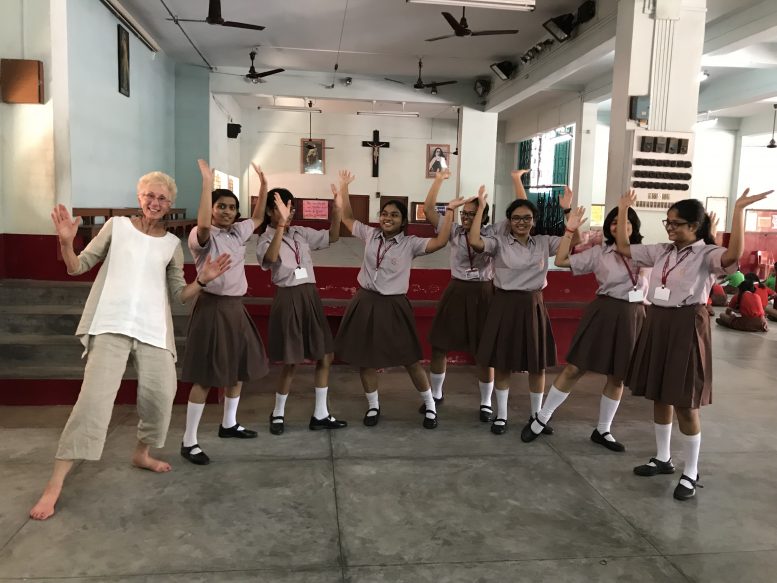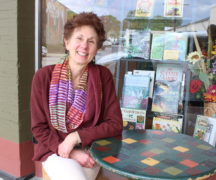By DAVID DUPONT
BG Independent News
Drama teacher Jo Beth Gonzalez got a change of scene this summer, and found happiness, or more precisely happiness curriculum
Gonzalez, who teaches at Bowling Green High School, traveled to India through the State Department’s Teachers for Global Classrooms fellowship. She spent three weeks in the country where she observed, taught, and learned, and established connections she hopes to foster back in Bowling Green.
She’d liked “to maintain connection with students and teachers at the high school and engage a couple of my colleagues in that as well. That’s one of my goals.”
“With my kids I think what I’ll share with them is that, in my opinion, from my experience, is that drama is a way to connect kids with each other and with other people, that drama continues to be a way to share insights and feelings and help people think no matter where we are.”
She hopes her Bowling Green students and those she met in India can become digital pen pals, using email, Skype, and other social media.
Gonzalez said the trip was just a taste. Citing the tale of the blind men and the elephant she said “I’d need to go back to India 17 more times before I had a fuller picture.
“I’m so grateful for these three weeks,” she said.
Gonzalez was traveling with a group of a dozen middle school and high school teachers, part of the larger 70 in the international program. She was the only arts teacher among those going to India, and one of a very few involved in the program. Most were science and social studies teachers.
The trip started Delhi to “acclimate ourselves to the culture.” While there they visited government schools, a two-year training program for teachers, a juvenile detention center, and a child welfare organization.
They also met with Delhi’s minister of education, Mahish Sisodia, who is promoting a happiness curriculum.
“It’s based on Gandhi’s concept that we should become centered within ourselves before we become educated,” Gonzalez said. “That concept seems to permeate Indian education.”
The school day, she said, begins with an assembly devoted to various meditation practices, different mindfulness activities, and yoga.”
All students practiced some yoga.
The idea is to connect with themselves and with each other, Gonzalez said.
“Drama by its very nature does some of that,” she said. “Students already, through drama, develop empathy. … I’d like to infuse more mindfulness practice into my teaching.”
From Delhi, she and another teacher were scheduled to go to Mumbai. But the monsoons were particularly fierce, and the U.S. Embassy advised it was not safe for them to travel there. So Gonzalez joined other teachers heading to Kolkote (formerly Calcutta). There she worked at Mount Carmel, a Catholic high school for young women.
Serendipitously she found out that one teacher was addressing the topic of human trafficking, which drama students at BGHS have been exploring for several years. Another teacher was engaging students in learning about water conservation, another issue Gonzalez’ students have tackled.
She was also able to teach the techniques of devised theater, were actors create their own script.
Gonzalez was impressed by the Indian students. She found they listened intently and absorbed what they heard. “Those students are brilliant. … Given the technological resources, India’s young people can change the world.”
As a Third World country, India faces many challenges. “The infrastructure is very, very weak, water, buildings, the economy. Yet despite that education is a priority.” Teachers who went to rural areas were more acutely aware of this than those, like herself, who stayed in urban centers.
In rural communities power outages are regular occurrence. Still, Gonzalez sensed a patience, a sense of concern for one another, even on the roads. “The way people drive with us it would result immediately in road rage.”
She became aware of how much energy Americans expend on air conditioning. Despite the high humidity and scorching temperatures, schools are not air conditioned. The female teachers wore saris, long pants, and scarves, occasionally dabbing a little sweat from their brows. They are accustomed to the heat.
Gonzalez, on the other hand, was soaking in sweat after teaching half a day.
Gonzalez said she was happy to be home. As soon as she arrived she drank a glass of water from the tap, ate some fresh, raw vegetables, and took an early morning run so she could hear the birds sing.
She’d gladly go back to India. Gonzalez said until the last couple years she hasn’t traveled abroad much. Two years ago she went to Seoul, South Korea, with her husband, Al Gonzalez, a Bowling Green State University professor. She did take the opportunity to teach a few classes in Korea. She’s taken students to London and Stratford, and plans to take students to Italy this school year.
When it comes to travel, she said, “whatever assumptions we have about places and people expect them to be broken when you have a truthful experience.”


